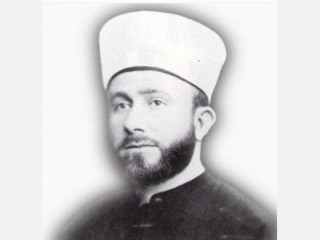
Al-Hajj Amin Al-Husayni biography
Date of birth : -
Date of death : 1974-07-04
Birthplace : Jerusalem
Nationality : Palestinian
Category : Famous Figures
Last modified : 2010-11-11
Credited as : Leader, Mufti of Jerusalem,
The preeminent Palestinian leader during most of the British mandate over Palestine, 1922 to 1948, was Al-Hajj Amin al-Husayni (1895-1974), the mufti of Jerusalem. As a Moslem scholar/leader he sought to establish an Arab state in Palestine. Unable to end Jewish immigration, he led a violent Arab revolt (1936-1939) against the Zionists and the British but failed, as did his attempt to stop the creation of Israel in 1948.
Al-Hajj Amin al-Husayni was born in 1895 in Jerusalem to a prominent Palestinian Muslim family. He studied in Cairo at al-Azhar and at the military academy in Istanbul. He served in the Ottoman army in 1916 but, because of Turkish attempts to impose their language and culture on their Arab subjects, he left for Palestine. There he assisted in the 1916 Arab revolt against the Ottomans and in the effort to form an Arab nation. Because he feared Zionism would cause the eventual domination or expulsion of the Palestinians from their homeland, he participated in an anti-Zionist demonstration in 1920. He fled to Damascus, but a year later he was pardoned and appointed to succeed his brother as mufti of Jerusalem.
In 1922 the new mufti was appointed president of the Supreme Muslim Council, with authority over religious institutions and with a budget of 50,000 pounds annually. These resources allowed him to extend his influence throughout Palestine. During the 1929 riots he was perceived as having stood up to the Zionists. The disturbance made him famous among Palestinians and infamous among Zionists.
In reality, he neither organized nor led the riots. Indeed, he cooperated with the British Palestine government in the 1920s and early 1930s, attempting to change British policy by appealing to the British and by holding a General Islamic Congress in 1931 to galvanize the Arab and Islamic world against Zionism and to goad them to pressure Britain. Instead, the British allowed Jewish immigration to increase to 61,854 in 1935, which radicalized the Palestinians. That year a revolutionary, Izz al-Din al-Qassam, was killed by British troops, which further embittered the Palestinians, who challenged the mufti's methods of cooperation. Until 1936 the mufti served two masters: his British employers, and his people. However, when the Arab revolt began in 1936, activists called on him to lead them against Zionism and British rule. As soon as he agreed to lead the revolt, as president of the Arab Higher Committee, he put himself on a collision course with the British government.
The British stripped him of his offices and tried to arrest him in 1937. He fled to Lebanon, from where he continued the revolt until it was suppressed in 1939. He then fled to Iraq, where he encouraged a pan-Arab revolt against the British in 1941. Prime Minister Winston Churchill authorized his assassination in Baghdad but the British and Zionist mission to assassinate him failed. Once again he fled, this time to Rome, then Berlin, where he negotiated with Hitler. The Nazis promised to help the Arab countries liberate themselves from British rule, for which the mufti helped with anti-British and anti-Jewish propaganda and recruited Muslim volunteers for the war effort. He sought but failed to limit the number of Jews leaving for Palestine. His association with the Nazis tainted his name and cause.
After the war he escaped to the Middle East to resume his struggle against Zionism and to establish a Palestine state. Subsequent to a British announcement of their intent to leave Palestine, the United Nations passed a partition resolution in 1947. The Zionists accepted but the Arabs, including the mufti, opposed it because it gave the Zionists 55 percent of Palestine although they owned only 7 percent. In the war that followed the establishment of Israel in 1948, the Arab armies were defeated and some 725,000 Palestinians left or were expelled. Within a few years the mufti lost his political following and became a Muslim leader, settling first in Cairo, then in Beirut, where he died in 1974.
An assessment of Husayni's political role indicates that both his policy of cooperation and, after 1935, of resistance failed to achieve any nationalist goals. Yet the overriding factors that frustrated the Palestinians had less to do with the mufti than with historical processes and the balance of forces. Vigorous Zionist efforts to establish a Jewish commonwealth in Palestine and the sometimes pro-Zionist British policy enabled the Zionists to grow from 50,000 to 600,000 and to establish quasi-governmental and military institutions. The Palestinians were a weak and traditional society and never a match for the occupying British and later the Zionists.
Until the 1970s biographies of the mufti were written by Zionists, such as Moshe Pearlman, Joseph Schechtman, and Eliahu Elath, who attempted to vilify him, or by Arab nationalists, such as Zuhayr al-Mardini, who praised him. An early scholarly account of the mufti's rise to power in the 1920s was a chapter in Y. Porath's Emergence of the Palestinian Arab-National Movement, 1918-1929 (1974). Majid Khadduri wrote a critical biographical sketch in his Arab Contemporaries (1973). A revisionist account is found in the author's succinct biography of Husayni's life, The Mufti of Jerusalem (1988, revised in 1992).
Elpeleg, Z. (Zvi), The grand mufti: Haj Amin al-Hussaini, founder of the Palestinian national movement, London, England; Portland, Or.: Frank Cass, 1992.
















